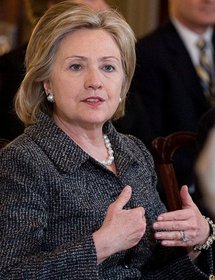
US Secretary of State Hillary Clinton
Only 10 years old, Dar al-Hekma was established to meet the demands of internationally oriented women who want good jobs, said Saleha Abedin, vice dean of institutional advancement.
Saudi government universities were educating women, but not many were producing graduates ready for jobs and most were getting married and staying at home.
"We tapped into the current demand of the market" of women seeking professional careers, Abedin told AFP.
"Our students get hired immediately if they want," she said.
For Saudi Arabia, that was a change -- though not particularly radical in Jeddah, the country's most progressive city.
About 1,000 women are in Dar al-Hekma's all-English courses in business administration, law, marketing, and special education -- including the first Saudi course in teaching autistic children.
Its largest programme is in graphic design, the country's first for women.
Unlike other universities, its US-designed curriculum requires women to do volunteer community service and encourages participation in sports, another traditional no-no.
And while it requires, like all Saudi institutions, Islamic courses, Abedin underscores the difference.
"We teach things like the history of women in Islam," she said.
The students are both Saudis and non-Saudis who grew up in the kingdom, mostly from Jeddah, because the campus lacks dormitories. It isn't cheap, with tuition of about 15,000 dollars a year more in the US range.
The college has more than a resemblance to Clinton's Wellesley: the two have a cooperative relationship which involves student exchanges and some course programming.
Likewise, say Jeddah locals, the students there are hardly radicals, but instead, like Clinton herself, more likely to become leaders by working within the system.
That is harder in Saudi Arabia, where women are required by an arch-conservative strain of Islam to stay separated from unrelated men, and where the first woman minister -- the deputy minister of education for women's education -- was only named last year.
Dar al-Hekma directs women to where there are real opportunities: business. Abedin estimates 60 percent of graduates have taken jobs, a large multiple of the ratio from public universities.
Jordan native, Jeddah-raised Dania al-Masri, a senior in graphic design, says she and five classmates are already planning their own non-profit company aimed at supporting social work.
"It opens doors to me when I didn't expect it," she said of the college.
During her studies she has been able to take school-related trips to Vienna and Boston. She says most of her classmates intend to get jobs rather than follow a traditional path of arranged marriage.
"Opportunities are out there. You have to be smart enough to get them," she says.
It is not the first time Dar al-Hekma has been in the spotlight in US-Middle East politics. In 2005 the Bush administration's special envoy for outreach to the Muslim world, Karen Hughes, also held a "town hall" meeting at the campus.
That fell somewhat flat, according to reports, amid the regional uproar over the US invasion and occupation of Iraq.
The visit by Clinton is expected to go a little better.
---------------------------------------------------------------------------
Saudi government universities were educating women, but not many were producing graduates ready for jobs and most were getting married and staying at home.
"We tapped into the current demand of the market" of women seeking professional careers, Abedin told AFP.
"Our students get hired immediately if they want," she said.
For Saudi Arabia, that was a change -- though not particularly radical in Jeddah, the country's most progressive city.
About 1,000 women are in Dar al-Hekma's all-English courses in business administration, law, marketing, and special education -- including the first Saudi course in teaching autistic children.
Its largest programme is in graphic design, the country's first for women.
Unlike other universities, its US-designed curriculum requires women to do volunteer community service and encourages participation in sports, another traditional no-no.
And while it requires, like all Saudi institutions, Islamic courses, Abedin underscores the difference.
"We teach things like the history of women in Islam," she said.
The students are both Saudis and non-Saudis who grew up in the kingdom, mostly from Jeddah, because the campus lacks dormitories. It isn't cheap, with tuition of about 15,000 dollars a year more in the US range.
The college has more than a resemblance to Clinton's Wellesley: the two have a cooperative relationship which involves student exchanges and some course programming.
Likewise, say Jeddah locals, the students there are hardly radicals, but instead, like Clinton herself, more likely to become leaders by working within the system.
That is harder in Saudi Arabia, where women are required by an arch-conservative strain of Islam to stay separated from unrelated men, and where the first woman minister -- the deputy minister of education for women's education -- was only named last year.
Dar al-Hekma directs women to where there are real opportunities: business. Abedin estimates 60 percent of graduates have taken jobs, a large multiple of the ratio from public universities.
Jordan native, Jeddah-raised Dania al-Masri, a senior in graphic design, says she and five classmates are already planning their own non-profit company aimed at supporting social work.
"It opens doors to me when I didn't expect it," she said of the college.
During her studies she has been able to take school-related trips to Vienna and Boston. She says most of her classmates intend to get jobs rather than follow a traditional path of arranged marriage.
"Opportunities are out there. You have to be smart enough to get them," she says.
It is not the first time Dar al-Hekma has been in the spotlight in US-Middle East politics. In 2005 the Bush administration's special envoy for outreach to the Muslim world, Karen Hughes, also held a "town hall" meeting at the campus.
That fell somewhat flat, according to reports, amid the regional uproar over the US invasion and occupation of Iraq.
The visit by Clinton is expected to go a little better.
---------------------------------------------------------------------------









 Home
Home Politics
Politics









